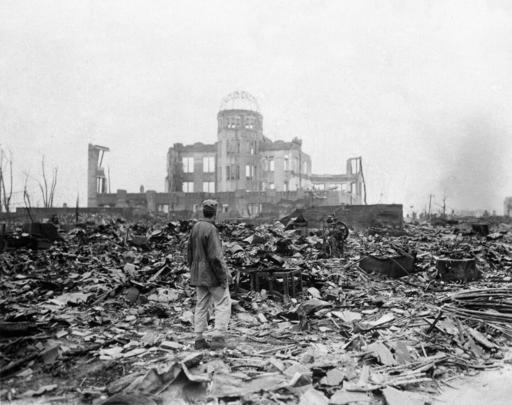
In this Sept. 8, 1945 file photo, an allied correspondent stands in the rubble in front of the shell of a building that once was a movie theater in Hiroshima, Japan, a month after the first atomic bomb ever used in warfare was dropped by the U.S. on Monday, Aug. 6, 1945. In a moment seven decades in the making, President Barack Obama this month will become the first sitting American president to visit Hiroshima, where the U.S. dropped an atomic bomb during World War II, decimating a city and exploding the world into the Atomic Age. AP
TOKYO — Japanese are welcoming President Barack Obama’s decision to visit the atomic-bombed city of Hiroshima, and those interviewed Wednesday said they aren’t seeking an apology.
Even those who want one realize that such a demand would have ruled out a U.S. presidential visit.
READ: Japanese welcome Obama’s upcoming Hiroshima visit
“Of course everyone wants to hear an apology. Our families were killed,” said Hiroshi Shimizu, general secretary of the Hiroshima Confederation of A-Bomb Sufferers Organizations.
“However, by setting conditions we limit world leaders from visiting, so we decided to eliminate that,” he said in Tokyo. “We would first like for them to come and stand on the grounds of Hiroshima and Nagasaki and take a good look at what is in front of them and give it good thought.”
The American and Japanese governments announced Tuesday that Obama would become the first sitting American president to visit Hiroshima, a city almost entirely destroyed by a U.S. atomic bomb on Aug. 6, 1945. Some 140,000 people were killed, and others have endured after-effects to this day.
In this May 25, 1984 file photo, guided by then-Hiroshima Mayor Takeshi Araki, former President Jimmy Carter carries a wreath to place at the memorial cenotaph, a monument that contains the names of those who died in the 1945 atomic bombing of Hiroshima, western Japan. In a moment seven decades in the making, President Barack Obama this month will become the first sitting American president to visit Hiroshima, where the U.S. dropped an atomic bomb during World War II, decimating a city and exploding the world into the Atomic Age. AP
The U.S. dropped a second devastating atomic bomb on the city of Nagasaki three days later. Japan announced it would surrender on Aug. 15, 1945, ending World War II.
Obama will visit Hiroshima with Japanese Prime Minister Shinzo Abe on May 27, after attending the annual Group of Seven summit in Japan.
“I don’t live in Hiroshima or Nagasaki, but I am overcome with emotion when I think that someone who wants to offer understanding is finally about to arrive,” said Mieko Mori, a 74-year-old woman who stopped at a memorial in Tokyo to pray for the victims.
A poll released this week by national broadcaster NHK found that 70 percent of Japanese want Obama to visit Hiroshima, and only 2 percent were opposed.
The visit is contentious in the U.S., where many believe the atomic bombs hastened the end of the war, saving countless other lives. The White House went out its way to stress Obama will not apologize.
Deputy National Security Adviser Ben Rhodes said Obama would “not revisit the decision to use the atomic bomb,” and instead spotlight the toll of war and offer a forward-looking vision of a non-nuclear world.
“I hear America is still divided over atomic bombings, but it’s been almost 71 years since the war ended, and I think it’s about time Obama should be able to visit Hiroshima,” said Kohachiro Hayashi, who was reading a newspaper at a Tokyo park.
“He wouldn’t have been able to come in the middle of his term, but now it’s almost the end, so it’s like now or never,” the retired teacher said.
Hayashi, 59, said asking for an apology would only cause an endless and fruitless debate over who should take blame for various wartime acts.
“We should just accept his visit as a gesture of sincerity,” he said. “It’s OK as long as he makes clear his commitment never to use atomic weapons. … I hope he will learn what happened and feel a little bit of it himself while being there.”
Another retired teacher said it would be rude to demand an apology.
“Japan was also trying to develop nuclear weapons,” Takatsugu Sakamoto, 80, said by telephone from Nishinomiya in Osaka prefecture. “Americans were just faster. If Japan hadn’t been trying, then it might make sense. And so to those who are demanding an apology, my response is: What in the world are you saying? Mr. Obama doesn’t need to apologize.”
Terumi Tanaka, the general secretary of the Japanese Confederation of A- and H-Bombs Sufferers Organizations, said his members want Obama to state clearly his intention to eliminate nuclear weapons.
“To me, that would be a true form of an apology,” he said. “For 70 years we have said this and felt this all along, that no one should have to suffer the same thing. Answering to that wish is a true sign of an apology to us.” TVJ